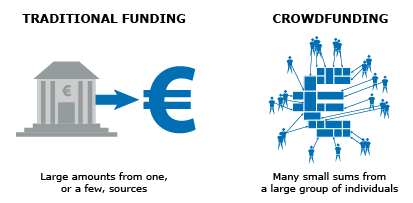
Crowdfunding
Crowdfunding is a way of raising money to finance projects and businesses. It enables fundraisers to collect money from a large number of people via online platforms. Traditionally, financing a business, project or venture involved asking a few people for large sums of money, however, crowdfunding switches this idea around, using the internet to talk to thousands – if not millions – of potential funders to raise smaller sums from a larger base of investors.
A Little Bit Of History
The first online crowdfunded project is thought to have occurred in 1997. Rock band Marillion were unable to afford to tour after the release of their seventh album so American fans used the then fledgling internet to raise $60,000 so they could play in the US. Although the band wasn’t involved in the first round of fundraising, they have since used the same techniques to successfully fund the production of their following three albums. Since then, this marketplace has grown substantially.
How does crowdfunding work?
Crowdfunding platforms are websites that enable interaction between fundraisers and the crowd. Financial pledges can be made and collected through the crowdfunding platform. Fundraisers are usually charged a fee by crowdfunding platforms if the fundraising campaign has been successful. In return, crowdfunding platforms are expected to provide a secure and easy to use service.
Many platforms operate an all-or-nothing funding model. This means that if you reach your target you get the money and if you don’t, everybody gets their money back – no hard feelings and no financial loss.
There are a number of crowdfunding types which are explained below which are used by profit-making SMEs and startups:
Peer-to-peer lending
The crowd lends money to a company with the understanding that the money will be repaid with interest. It is very similar to traditional borrowing from a bank, except that you borrow from lots of investors.
Equity crowdfunding
Sale of a stake in a business to a number of investors in return for investment. The idea is similar to how common stock is bought or sold on a stock exchange, or to a venture capital.
Rewards-based crowdfunding
Individuals donate to a project or business with expectations of receiving in return a non-financial reward, such as goods or services, at a later stage in exchange of their contribution.
Donation-based crowdfunding
Individuals donate small amounts to meet the larger funding aim of a specific charitable project while receiving no financial or material return.
Profit-sharing / revenue-sharing
Businesses can share future profits or revenues with the crowd in return for funding now.
Debt-securities crowdfunding
Individuals invest in a debt security issued by the company, such as a bond.
Hybrid models
Offer businesses the opportunity to combine elements of more than one crowdfunding type.
NASD in its capacity as an Exchange continues to facilitate capital raise across various sectors within the Nigerian economy and Africa in extension. We believe that crowdfunding would provide an alternative capital raise avenue and a viable platform to stimulate investment flows into enterprises in Nigeria, especially MSMEs who have historically experienced difficulty in accessing funds for sustenance and expansion of operations.
NASD
Creating liquidity…transparently
